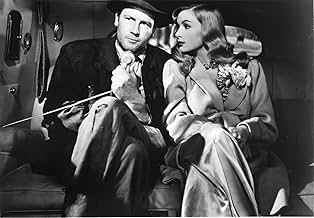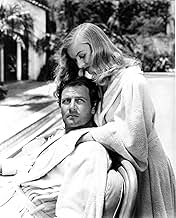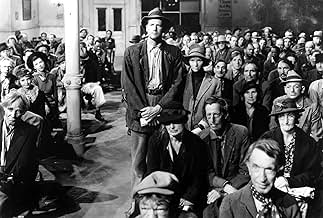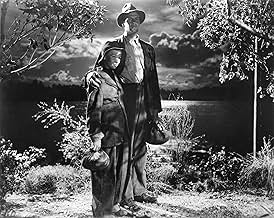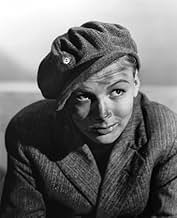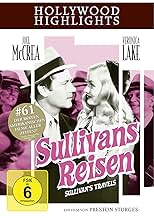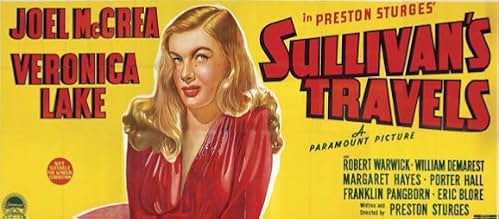CALIFICACIÓN DE IMDb
7.9/10
30 k
TU CALIFICACIÓN
El director de Hollywood John L Sullivan se propone experimentar la vida como una persona sin hogar para obtener una experiencia de vida relevante para su próxima película.El director de Hollywood John L Sullivan se propone experimentar la vida como una persona sin hogar para obtener una experiencia de vida relevante para su próxima película.El director de Hollywood John L Sullivan se propone experimentar la vida como una persona sin hogar para obtener una experiencia de vida relevante para su próxima película.
- Premios
- 2 premios ganados en total
Charles R. Moore
- Colored Chef
- (as Charles Moore)
- Dirección
- Guionista
- Todo el elenco y el equipo
- Producción, taquilla y más en IMDbPro
Opiniones destacadas
As a TV Producer of "entertainment" shows, I make a point of watching this film at least once a year and giving DVDs of it to all who may disparage what I do.
Preston Sturges achieves the impossible in this movie: he has his cake and eats it too. He makes a perfect film - he manages to make a socially significant statement while wrapping it up in a comedy confection.
His hero, John L. Sullivan (Joel McCrea - a very underestimated actor) is a
succcessful director of frivolous musicals and comedies who, one day, decides he needs to make a Capra-esque "serious"film. His studio chiefs and immediate staff are against it and point out that he is rich and privileged, what does he know about the less fortunate? Sullivan retorts with an ingenious plan:
Sullivan: "You're perfectly right...but I'll tell you what I'm going to do first: I'm going to get some old clothes and some old shoes from wardrobe and start out with ten cents in my pocket...and I'm not coming back till I know what trouble it..I'm going out on the road to find out what it's like to be poor and needy and then I'm going to make a picture about it."
Burrows(his butler): If you'll permit me to say so, sir, the subject is not an interesting one. The poor know all about poverty and only the morbid rich would find the topic glamorous.
Nevertheless, Sullivan does it and unwittingly (and hilariously) discovers the true value comedy has in the lives of those with little else to laugh about...
It's genius. Exquisitely written, directed and acted (Sturges uses his usual ensemble plus the ever watchable Veronica Lake, even here in her most improbable disguises [I met her, professionally, in England in the 70s, she was still a class act and her "rider" demanded her drink of choice - vodka and cranberry juice).
Sullivan's Travels is a true gem of American Cinema. Ten out of ten.
Preston Sturges achieves the impossible in this movie: he has his cake and eats it too. He makes a perfect film - he manages to make a socially significant statement while wrapping it up in a comedy confection.
His hero, John L. Sullivan (Joel McCrea - a very underestimated actor) is a
succcessful director of frivolous musicals and comedies who, one day, decides he needs to make a Capra-esque "serious"film. His studio chiefs and immediate staff are against it and point out that he is rich and privileged, what does he know about the less fortunate? Sullivan retorts with an ingenious plan:
Sullivan: "You're perfectly right...but I'll tell you what I'm going to do first: I'm going to get some old clothes and some old shoes from wardrobe and start out with ten cents in my pocket...and I'm not coming back till I know what trouble it..I'm going out on the road to find out what it's like to be poor and needy and then I'm going to make a picture about it."
Burrows(his butler): If you'll permit me to say so, sir, the subject is not an interesting one. The poor know all about poverty and only the morbid rich would find the topic glamorous.
Nevertheless, Sullivan does it and unwittingly (and hilariously) discovers the true value comedy has in the lives of those with little else to laugh about...
It's genius. Exquisitely written, directed and acted (Sturges uses his usual ensemble plus the ever watchable Veronica Lake, even here in her most improbable disguises [I met her, professionally, in England in the 70s, she was still a class act and her "rider" demanded her drink of choice - vodka and cranberry juice).
Sullivan's Travels is a true gem of American Cinema. Ten out of ten.
10jhclues
When it comes right down to it, what you `think' you want isn't necessarily what you `really' want, nor is it likely to be anything you need. But finding the answer is up to the individual, a prospect that's explored in the satirical `Sullivan's Travels,' directed by Preston Sturges. Movie director John L. Sullivan (Joel McCrea) has made a career of churning out one successful comedy after another, yet he remains unfulfilled. He longs to do a `serious' film, one with meaning, a drama that will leave his mark on the industry and the world. And he has a property that he thinks is perfect, a screenplay entitled `O Brother, Where Art Thou?' The studio he works for, however, balks at the idea; Sullivan's comedies are not only good, they're a cash cow for the studio, so why fool with success?
Sullivan is adamant, though, and determined to make his film he strikes a bargain with the studio and gets the green light. But once he's given the go-ahead, he wants to do it right-- and he realizes that to make a truly meaningful film, he must first experience himself the hardships of life he will be examining in `O Brother.' So with only a dime in his pockets, he sets out on the road to find out what `life' is really all about. And before it's over, he will get all he's looking for and more, in an odyssey that will be unforgettable for Sullivan, and for the audience, as well.
Filled with pathos and poignancy, Sturges' film is an insightful sojourn across the territory of the human condition. It'll make you laugh and it'll make you cry, as along with Sullivan you come face to face with some hard truths about reality. And Sullivan's eventual epiphany regarding his personal wants and needs may be your own, as well, because this is a film with a definite message that is honest and undeniable. A lesson in life delivered subtly and sensitively by Sturges, who makes it entertaining and thought provoking at the same time. It's refreshing, in fact, t discover a film that delivers such an impact without having to resort to any kind of sensationalism, relying instead on the inherent humanity of the story, which Sturges conveys masterfully. With exceptions, of course, it's a sensibility few of today's directors seem to possess. Some notable exceptions would be Ang Lee with `The Ice Storm,' Kenneth Lonergan's `You Can Count On Me' and Tom DiCillo's `Box of Moonlight.' All are films that, like `Sullivan,' are journeys of discovery, profound in sentiment without being overly sentimental. There are more, to be sure, but they seem too few and far between.
One of the elements that makes this film so engaging is its colorful cast of characters, and the actors it employs to bring it to life, beginning with it's star, McCrea, who hits his stride as Sullivan with facility. He credibly reflects Sullivan's ideals and principles with a look, as well as an attitude, that makes it work quite naturally. You can believe this is a man with, perhaps not a naive, but certainly a rather guarded perception of life in the real world. Which is not to say he lacks insight or wisdom; it's merely one of the basic truths this film points out-- that people live within parameters of their own design, established through personal experience and frame of reference. And that's the John Sullivan McCrea presents here, with a portrayal that is honest and incisive.
Veronica Lake was one of the hottest actresses around in 1942 when this film was made, and as the girl who becomes a part of Sullivan's journey, she lends considerable charm and a bit of mystique to the film. It's a fairly straightforward role that benefits from her sparkle and personality; a notable performance that adds a touch of humor and some class to the proceedings, without being particularly exceptional. But watching her, it's easy to understand the attention she received, especially after draping her long blond hair across her eye, peek-a-boo style-- which started a craze that swept the country, while creating an indelible image that ultimately defined her career.
The supporting cast includes Robert Warwick (Mr. Lebrand), William Demarest (Mr. Jones), Franklin Pangborn (Mr. Casalsis), Porter Hall (Mr. Hadrian), Byron Foulger (Mr. Valdelle), Margaret Hayes (Secretary), Robert Greig (Sullivan's Butler) and Eric Blore (Sullivan's Valet). Call it a lesson in life, or a lesson about human nature; however you see it, `Sullivan's Travels' is an experience you're going to remember. Entertaining, enjoyable and enlightening, it's an uplifting appreciation of the way things are, and not necessarily the way you `think' they should be. It's a film that celebrates the comfort to be found in finding your own niche and realizing the importance of whatever it is that you contribute to your world and those around you. It leaves you with a sense of purpose and the understanding that the grass is not always greener on the other side. And it makes your own grass look pretty good in the bargain. It's the magic of the movies. I rate this one 10/10.
Sullivan is adamant, though, and determined to make his film he strikes a bargain with the studio and gets the green light. But once he's given the go-ahead, he wants to do it right-- and he realizes that to make a truly meaningful film, he must first experience himself the hardships of life he will be examining in `O Brother.' So with only a dime in his pockets, he sets out on the road to find out what `life' is really all about. And before it's over, he will get all he's looking for and more, in an odyssey that will be unforgettable for Sullivan, and for the audience, as well.
Filled with pathos and poignancy, Sturges' film is an insightful sojourn across the territory of the human condition. It'll make you laugh and it'll make you cry, as along with Sullivan you come face to face with some hard truths about reality. And Sullivan's eventual epiphany regarding his personal wants and needs may be your own, as well, because this is a film with a definite message that is honest and undeniable. A lesson in life delivered subtly and sensitively by Sturges, who makes it entertaining and thought provoking at the same time. It's refreshing, in fact, t discover a film that delivers such an impact without having to resort to any kind of sensationalism, relying instead on the inherent humanity of the story, which Sturges conveys masterfully. With exceptions, of course, it's a sensibility few of today's directors seem to possess. Some notable exceptions would be Ang Lee with `The Ice Storm,' Kenneth Lonergan's `You Can Count On Me' and Tom DiCillo's `Box of Moonlight.' All are films that, like `Sullivan,' are journeys of discovery, profound in sentiment without being overly sentimental. There are more, to be sure, but they seem too few and far between.
One of the elements that makes this film so engaging is its colorful cast of characters, and the actors it employs to bring it to life, beginning with it's star, McCrea, who hits his stride as Sullivan with facility. He credibly reflects Sullivan's ideals and principles with a look, as well as an attitude, that makes it work quite naturally. You can believe this is a man with, perhaps not a naive, but certainly a rather guarded perception of life in the real world. Which is not to say he lacks insight or wisdom; it's merely one of the basic truths this film points out-- that people live within parameters of their own design, established through personal experience and frame of reference. And that's the John Sullivan McCrea presents here, with a portrayal that is honest and incisive.
Veronica Lake was one of the hottest actresses around in 1942 when this film was made, and as the girl who becomes a part of Sullivan's journey, she lends considerable charm and a bit of mystique to the film. It's a fairly straightforward role that benefits from her sparkle and personality; a notable performance that adds a touch of humor and some class to the proceedings, without being particularly exceptional. But watching her, it's easy to understand the attention she received, especially after draping her long blond hair across her eye, peek-a-boo style-- which started a craze that swept the country, while creating an indelible image that ultimately defined her career.
The supporting cast includes Robert Warwick (Mr. Lebrand), William Demarest (Mr. Jones), Franklin Pangborn (Mr. Casalsis), Porter Hall (Mr. Hadrian), Byron Foulger (Mr. Valdelle), Margaret Hayes (Secretary), Robert Greig (Sullivan's Butler) and Eric Blore (Sullivan's Valet). Call it a lesson in life, or a lesson about human nature; however you see it, `Sullivan's Travels' is an experience you're going to remember. Entertaining, enjoyable and enlightening, it's an uplifting appreciation of the way things are, and not necessarily the way you `think' they should be. It's a film that celebrates the comfort to be found in finding your own niche and realizing the importance of whatever it is that you contribute to your world and those around you. It leaves you with a sense of purpose and the understanding that the grass is not always greener on the other side. And it makes your own grass look pretty good in the bargain. It's the magic of the movies. I rate this one 10/10.
As original a piece from the 1940s as you'll likely come across and one where it could quite easily have found itself as knotted and gnarled as some of the boots seen pounding the highways and byways of its cast. Fortunately those pretentious rips fail to appear and it's the arrival of Veronica Lake that turns the ramble to a journey and an illustration as relevant today about the lack of opportunity we continually chose to turn a blind eye to. An interesting twist towards the end provides something to chew on and supports a finale that may well give you a little to smile about, maybe even a chuckle.
No need to add to the praise others have justly given this classic, but there's one thing I think is especially clever about the plot (without giving too much of it away). The apparent moral of this Depression-era movie is that bad as conditions may be, audiences don't need to be reminded about them, instead needing escapist fare to distract them from the world's problems. Meanwhile, after setting you up to relax and enjoy a screwball comedy, Sturges succeeds in surreptitiously drawing you into just the kind of bleak "social consciousness" movie his characters are saying is impossible to get people to watch, without your realizing it at the time. Well, without my realizing it, anyway, until much later.
After the opening credits, the film opens with the following statement.
"To the memory of those who made us laugh: the motley mountebanks, the clowns, the buffoons, in all times and in all nations whose efforts have lightened our burden a little, this picture is affectionately dedicated."
With this film, Preston Sturges made one of the smartest and most insightful comedies ever to come out of Hollywood, in which he especially held up the mirror to Tinseltown itself. A Hollywood variation on Gulliver's Travels, it's the tale of Hollywood director John Sullivan (Joel McCrea), tired of making Hollywood Fluff, who wants to branch out with a socially conscious epic, called "O Brother, Where Art Thou", and sets out to research the meaning of poverty. His studio bosses (very funny roles by Robert Warwick and Porter Hall) try to tell him it's a ridiculous idea but Sullivan insists, puts on some hobo clothes and sets out to see what it's like to experience poverty and suffering. The studio soon sees it as potential publicity stunt and sent an entire crew to follow him around during his trip.
Some very enjoyable references to socially conscious movie-making, to Ernst Lubitch in particular, make this particularly fun with some knowledge of the period and the films mentioned, albeit not necessary. And almost worth seeing alone for Veronica Lake's memorable performance as a failed starlet.
According to Sturges, the film did contain a little "message":
"SULLIVAN'S TRAVELS is the result of an urge, an urge to tell some of my fellow filmwrights that they were getting a little too deep-dish and to leave the preaching to the preachers."
By any means, he made a uniquely self-reflective comedy about Hollywood with wonderful characterizations and superlative performances. A brilliant satire with a "message" just as poignant as ever.
Camera Obscura --- 9/10
"To the memory of those who made us laugh: the motley mountebanks, the clowns, the buffoons, in all times and in all nations whose efforts have lightened our burden a little, this picture is affectionately dedicated."
With this film, Preston Sturges made one of the smartest and most insightful comedies ever to come out of Hollywood, in which he especially held up the mirror to Tinseltown itself. A Hollywood variation on Gulliver's Travels, it's the tale of Hollywood director John Sullivan (Joel McCrea), tired of making Hollywood Fluff, who wants to branch out with a socially conscious epic, called "O Brother, Where Art Thou", and sets out to research the meaning of poverty. His studio bosses (very funny roles by Robert Warwick and Porter Hall) try to tell him it's a ridiculous idea but Sullivan insists, puts on some hobo clothes and sets out to see what it's like to experience poverty and suffering. The studio soon sees it as potential publicity stunt and sent an entire crew to follow him around during his trip.
Some very enjoyable references to socially conscious movie-making, to Ernst Lubitch in particular, make this particularly fun with some knowledge of the period and the films mentioned, albeit not necessary. And almost worth seeing alone for Veronica Lake's memorable performance as a failed starlet.
According to Sturges, the film did contain a little "message":
"SULLIVAN'S TRAVELS is the result of an urge, an urge to tell some of my fellow filmwrights that they were getting a little too deep-dish and to leave the preaching to the preachers."
By any means, he made a uniquely self-reflective comedy about Hollywood with wonderful characterizations and superlative performances. A brilliant satire with a "message" just as poignant as ever.
Camera Obscura --- 9/10
¿Sabías que…?
- TriviaCinematographer John Seitz admired Preston Sturges' unconventional approach to his work. The opening scene comprised ten pages of dialogue to cover about four and a half minutes of screen time. It was scheduled for two complete days of shooting. On the morning of the first day, Seitz found Sturges inspecting the set with a viewfinder, looking for where he could cut the scene and change camera set-ups. Seitz dared him to do it all in one take. Never one to refuse a dare, Sturges took him up on it, although the nervous Seitz had never attempted to complete a two-day work schedule in one day. With the endorsement of McCrea and the rest of the actors, Sturges pressed on, determined to set a record. The first take was fine, but the camera wobbled a little in the tracking shot following the men from screening room to office, so they tried again. They did two or three takes at the most and that was it - two full days work by 11 a.m. on the first day, a feat that had the entire studio buzzing.
- ErroresWhen Sullivan and the Girl jump off the train and walk to the lunch stand, nothing is visible around the outside of the lunch stand--not a car, tree or anything. When Sullivan asks if the proprietor had seen a land yacht (a big RV), the proprietor points to the side and they look out the window and see the big land yacht parked there. Of course, if it had been there in the first place, Sullivan would have seen it right away and not gone into the lunch stand.
- Citas
[last lines]
John L. Sullivan: There's a lot to be said for making people laugh. Did you know that that's all some people have? It isn't much, but it's better than nothing in this cockeyed caravan.
- Créditos curiososThe Paramount logo appears as a seal on a package.
The package is opened to reveal a book with the film title on it and the opening credits appear on pages in the book.
- ConexionesFeatured in The Cinematographer (1951)
- Bandas sonorasSpring Song
(1844) (uncredited)
Written by Felix Mendelssohn
Played as part of the score when Sullivan starts his experiment
Reprised when he starts a second time
Selecciones populares
Inicia sesión para calificar y agrega a la lista de videos para obtener recomendaciones personalizadas
- How long is Sullivan's Travels?Con tecnología de Alexa
Detalles
Taquilla
- Presupuesto
- USD 689,665 (estimado)
- Total a nivel mundial
- USD 10,390
- Tiempo de ejecución
- 1h 30min(90 min)
- Color
- Relación de aspecto
- 1.37 : 1
Contribuir a esta página
Sugiere una edición o agrega el contenido que falta


